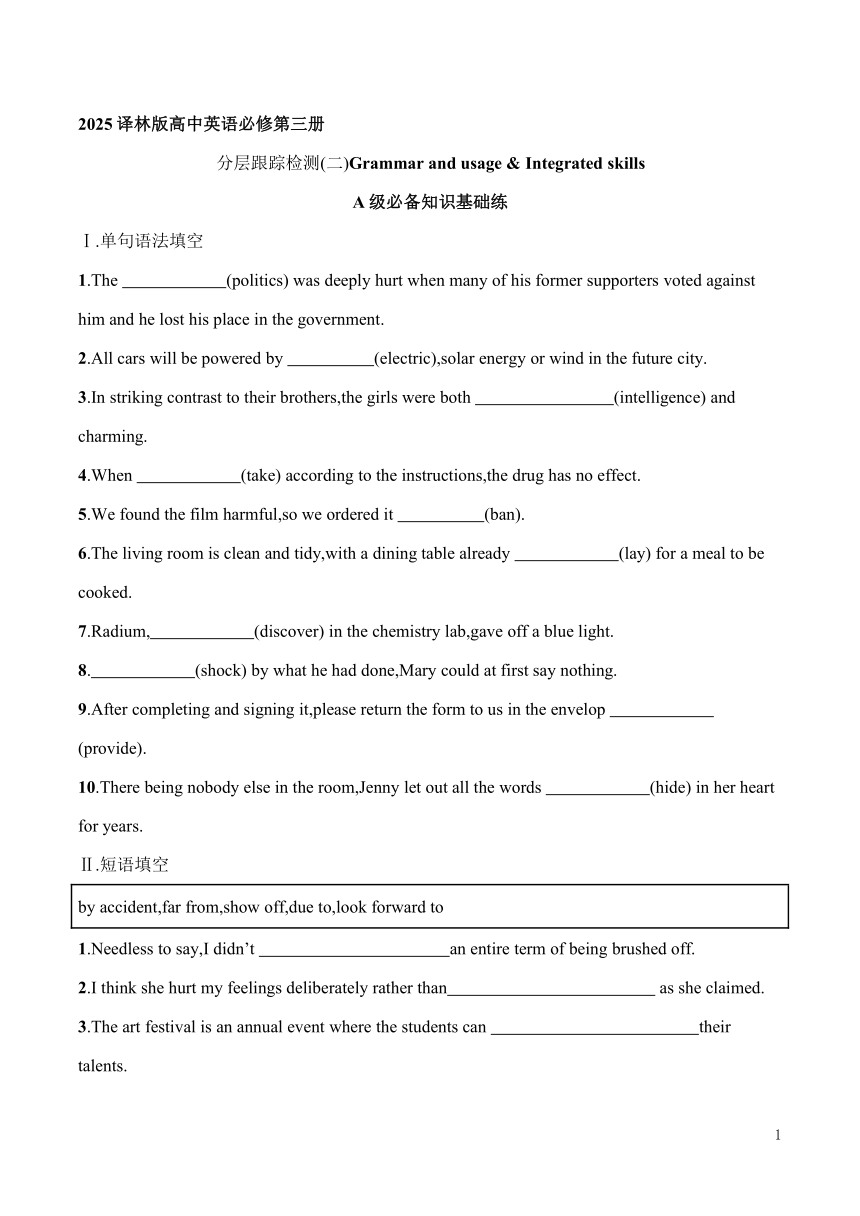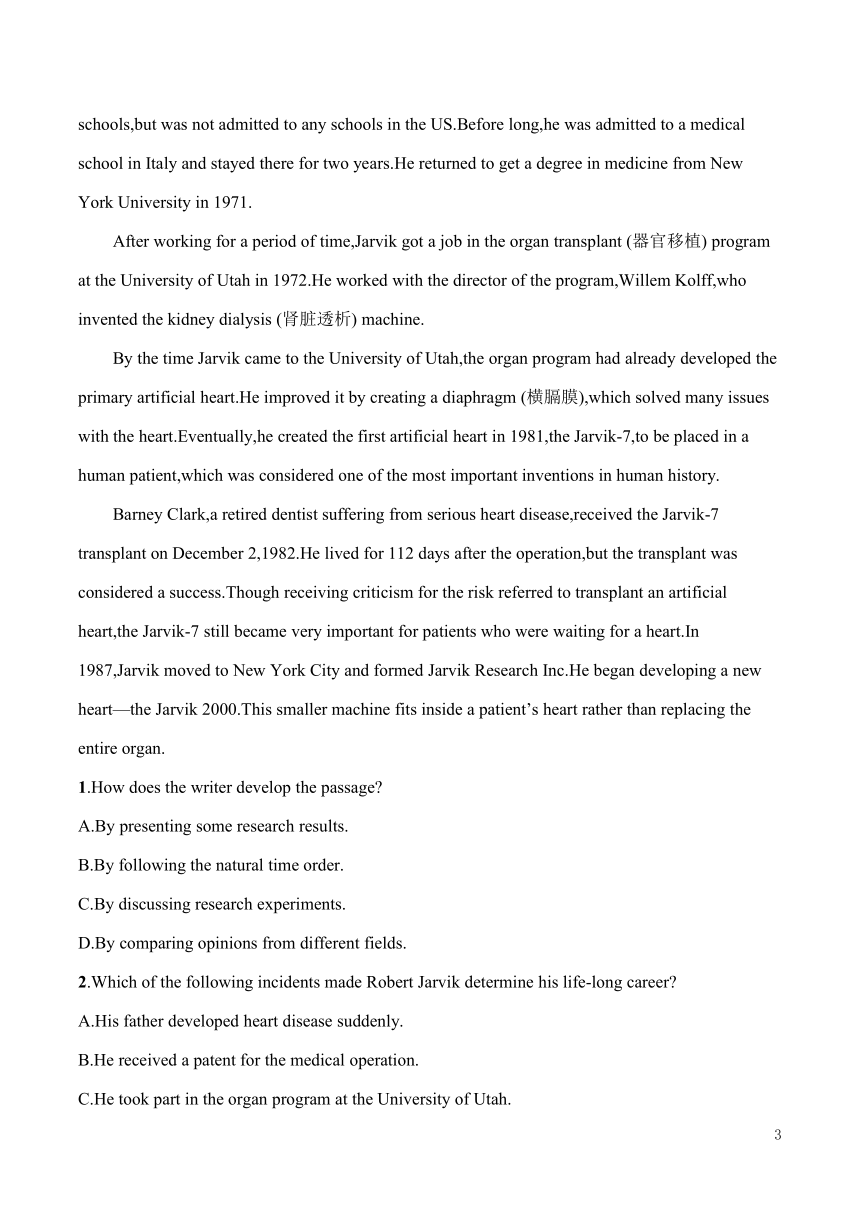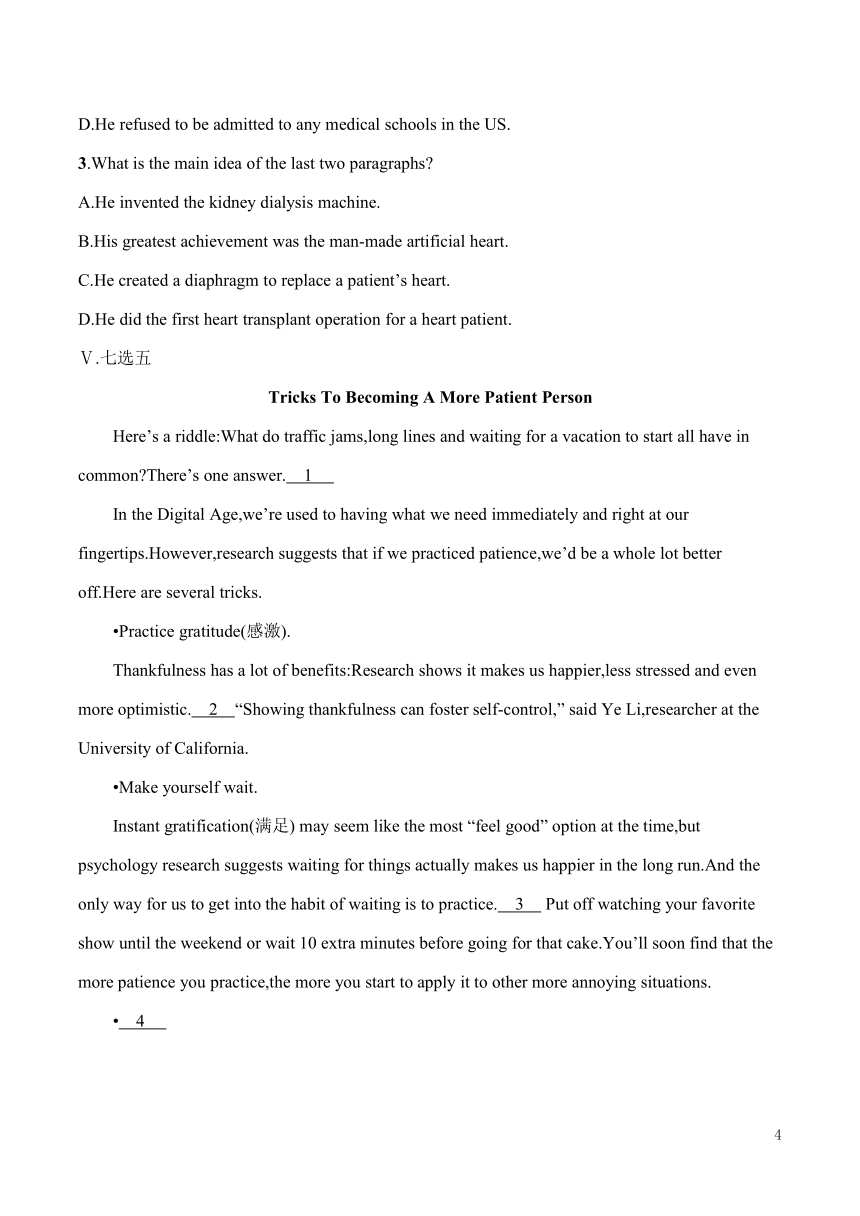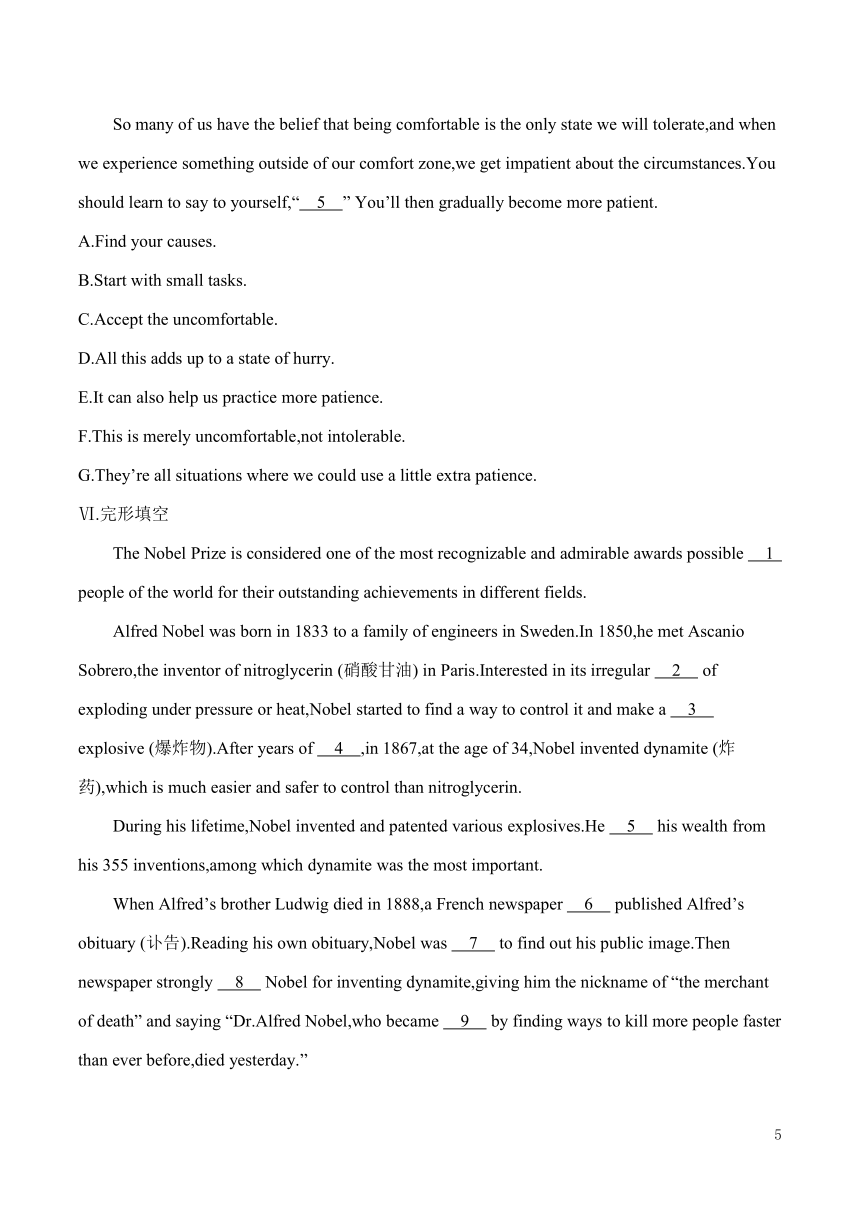UNIT 4 Scientists who changed the world 分层跟踪检测(2)Grammar and usage & Integrated skills--2025译林版高中英语必
文档属性
| 名称 | UNIT 4 Scientists who changed the world 分层跟踪检测(2)Grammar and usage & Integrated skills--2025译林版高中英语必 |

|
|
| 格式 | docx | ||
| 文件大小 | 31.4KB | ||
| 资源类型 | 试卷 | ||
| 版本资源 | 牛津译林版(2019) | ||
| 科目 | 英语 | ||
| 更新时间 | 2025-06-16 13:00:39 | ||
图片预览





文档简介
2025译林版高中英语必修第三册
分层跟踪检测(二)Grammar and usage & Integrated skills
A级必备知识基础练
Ⅰ.单句语法填空
1.The (politics) was deeply hurt when many of his former supporters voted against him and he lost his place in the government.
2.All cars will be powered by (electric),solar energy or wind in the future city.
3.In striking contrast to their brothers,the girls were both (intelligence) and charming.
4.When (take) according to the instructions,the drug has no effect.
5.We found the film harmful,so we ordered it (ban).
6.The living room is clean and tidy,with a dining table already (lay) for a meal to be cooked.
7.Radium, (discover) in the chemistry lab,gave off a blue light.
8. (shock) by what he had done,Mary could at first say nothing.
9.After completing and signing it,please return the form to us in the envelop (provide).
10.There being nobody else in the room,Jenny let out all the words (hide) in her heart for years.
Ⅱ.短语填空
by accident,far from,show off,due to,look forward to
1.Needless to say,I didn’t an entire term of being brushed off.
2.I think she hurt my feelings deliberately rather than as she claimed.
3.The art festival is an annual event where the students can their talents.
4. the efforts of the local government,up to 200 children can go back to school.
5.The art show was a failure;it was a great success.
Ⅲ.单句写作
1.如果我没有面对那么多的障碍,我现在就不会在这里。
If so many barriers,I wouldn’t be where I am.
2.到目前为止,还没有人来拿走在图书馆发现的书。
So far nobody has come to take away .
3.他决心戒烟,把剩下的香烟都扔掉了。
,he threw away his remaining cigarettes.
4.我们通常根据我们的目标来做重要的决定。
We usually make the important decision .
5.得到父母的支持,他坚信没有什么事比提升自己更重要了。
his parents,he firmly believed that than becoming a better self.
B级能力素养提升练
Ⅳ.阅读理解
Robert Jarvik,born on May 11,1946 in Michigan and raised in Stamford,is a medical scientist and researcher,who played an important role in the invention of the artificial heart.He was interested in medicine from a young age.He watched his father perform operations and gained a patent (专利权) for a machine applied in the medical operation before he graduated from high school.
Jarvik attended Syracuse University and considered a career in art.When his father developed heart disease suddenly,he decided then to work on a medical career.He applied to medical schools,but was not admitted to any schools in the US.Before long,he was admitted to a medical school in Italy and stayed there for two years.He returned to get a degree in medicine from New York University in 1971.
After working for a period of time,Jarvik got a job in the organ transplant (器官移植) program at the University of Utah in 1972.He worked with the director of the program,Willem Kolff,who invented the kidney dialysis (肾脏透析) machine.
By the time Jarvik came to the University of Utah,the organ program had already developed the primary artificial heart.He improved it by creating a diaphragm (横膈膜),which solved many issues with the heart.Eventually,he created the first artificial heart in 1981,the Jarvik-7,to be placed in a human patient,which was considered one of the most important inventions in human history.
Barney Clark,a retired dentist suffering from serious heart disease,received the Jarvik-7 transplant on December 2,1982.He lived for 112 days after the operation,but the transplant was considered a success.Though receiving criticism for the risk referred to transplant an artificial heart,the Jarvik-7 still became very important for patients who were waiting for a heart.In 1987,Jarvik moved to New York City and formed Jarvik Research Inc.He began developing a new heart—the Jarvik 2000.This smaller machine fits inside a patient’s heart rather than replacing the entire organ.
1.How does the writer develop the passage
A.By presenting some research results.
B.By following the natural time order.
C.By discussing research experiments.
D.By comparing opinions from different fields.
2.Which of the following incidents made Robert Jarvik determine his life-long career
A.His father developed heart disease suddenly.
B.He received a patent for the medical operation.
C.He took part in the organ program at the University of Utah.
D.He refused to be admitted to any medical schools in the US.
3.What is the main idea of the last two paragraphs
A.He invented the kidney dialysis machine.
B.His greatest achievement was the man-made artificial heart.
C.He created a diaphragm to replace a patient’s heart.
D.He did the first heart transplant operation for a heart patient.
Ⅴ.七选五
Tricks To Becoming A More Patient Person
Here’s a riddle:What do traffic jams,long lines and waiting for a vacation to start all have in common There’s one answer. 1
In the Digital Age,we’re used to having what we need immediately and right at our fingertips.However,research suggests that if we practiced patience,we’d be a whole lot better off.Here are several tricks.
Practice gratitude(感激).
Thankfulness has a lot of benefits:Research shows it makes us happier,less stressed and even more optimistic. 2 “Showing thankfulness can foster self-control,” said Ye Li,researcher at the University of California.
Make yourself wait.
Instant gratification(满足) may seem like the most “feel good” option at the time,but psychology research suggests waiting for things actually makes us happier in the long run.And the only way for us to get into the habit of waiting is to practice. 3 Put off watching your favorite show until the weekend or wait 10 extra minutes before going for that cake.You’ll soon find that the more patience you practice,the more you start to apply it to other more annoying situations.
4
So many of us have the belief that being comfortable is the only state we will tolerate,and when we experience something outside of our comfort zone,we get impatient about the circumstances.You should learn to say to yourself,“ 5 ” You’ll then gradually become more patient.
A.Find your causes.
B.Start with small tasks.
C.Accept the uncomfortable.
D.All this adds up to a state of hurry.
E.It can also help us practice more patience.
F.This is merely uncomfortable,not intolerable.
G.They’re all situations where we could use a little extra patience.
Ⅵ.完形填空
The Nobel Prize is considered one of the most recognizable and admirable awards possible 1 people of the world for their outstanding achievements in different fields.
Alfred Nobel was born in 1833 to a family of engineers in Sweden.In 1850,he met Ascanio Sobrero,the inventor of nitroglycerin (硝酸甘油) in Paris.Interested in its irregular 2 of exploding under pressure or heat,Nobel started to find a way to control it and make a 3 explosive (爆炸物).After years of 4 ,in 1867,at the age of 34,Nobel invented dynamite (炸药),which is much easier and safer to control than nitroglycerin.
During his lifetime,Nobel invented and patented various explosives.He 5 his wealth from his 355 inventions,among which dynamite was the most important.
When Alfred’s brother Ludwig died in 1888,a French newspaper 6 published Alfred’s obituary (讣告).Reading his own obituary,Nobel was 7 to find out his public image.Then newspaper strongly 8 Nobel for inventing dynamite,giving him the nickname of “the merchant of death” and saying “Dr.Alfred Nobel,who became 9 by finding ways to kill more people faster than ever before,died yesterday.”
To Alfred,this obituary was a(n) 10 .He spent his lifetime alone 11 things and was deeply concerned with how he would be remembered.This unfortunate event inspired him to make changes in his will so as to 12 his public image,and to be remembered for a good cause.In 1895,one year before his death,Nobel made the last 13 ,saying clearly that his wealth would be used to create a series of prizes for those who have made great 14 to mankind in physics,chemistry,physiology or medicine,literature,and peace.To widespread astonishment,Dr.Alfred Nobel 15 94% of his total wealth to found the five Nobel Prizes.
1.A.remembering B.honouring
C.crediting D.negating
2.A.nature B.conduct
C.flavour D.benefit
3.A.deadly B.bitter
C.usable D.mild
4.A.innovations B.efforts
C.hesitation D.association
5.A.brought up B.put up
C.broke up D.built up
6.A.mistakenly B.purposefully
C.unintentionally D.scientifically
7.A.satisfied B.relieved
C.impressed D.disappointed
8.A.praised B.blamed
C.appreciated D.favoured
9.A.greedy B.essential
C.rich D.sufficient
10.A.error B.warning
C.threat D.consequence
11.A.destroying B.inventing
C.combining D.stimulating
12.A.improve B.establish
C.illustrate D.secure
13.A.request B.illustration
C.will D.fortune
14.A.choices B.decisions
C.profits D.contributions
15.A.gave away B.gave back
C.gave off D.gave out
UNIT 4
分层跟踪检测(二)Grammar and usage & Integrated skills
Ⅰ.1.politician 2.electricity 3.intelligent 4.taken 5.banned 6.laid 7.discovered 8.Shocked 9.provided 10.hidden
Ⅱ.1.look forward to 2.by accident 3.show off 4.Due to 5.far from
Ⅲ.1.I hadn’t been faced with 2.the books discovered in the library 3.Determined to give up smoking 4.based on our aims 5.Supported by;there was nothing more important
Ⅳ.【语篇导读】本文是一篇说明文。文章主要介绍了医学科学家罗伯特·贾维克发明了人造心脏及人造心脏的作用。
1.B 推理判断题。文章出现了大量的具体时间,例如“May 11,1946”“1971”和“1981”等,遵循自然时间顺序来描述罗伯特·贾维克的成长经历及他所获得的成就。由此可知,作者是按照自然的时间顺序展开这篇文章的。故选B项。
2.A 细节理解题。根据第二段中的“When his father developed heart disease suddenly,he decided then to work on a medical career.”可知,罗伯特·贾维克的父亲突然患上了心脏病,这使他决定把医学作为他的终身职业。故选A项。
3.B 段落大意题。根据最后两段内容可知,贾维克最大的成就是人造心脏。故选B项。
Ⅴ.【语篇导读】本文是一篇说明文。文章主要为读者提供了“成为一个有耐心的人”的方法:表达感谢、学会等待、走出舒适区。
1.G 此句为细节句。根据第一段第一句“Here’s a riddle: What do traffic jams, long lines and waiting for a vacation to start all have in common ”可知,交通堵塞、排长队、等待假期开始都是需要耐心的事情,这与G项“They’re all situations where we could use a little extra patience.”相吻合,且呼应第二段中的“practiced patience”。故选G项。
2.E 此句为细节句。第三段第一句“Thankfulness has a lot of benefits: Research shows it makes us happier, less stressed and even more optimistic.”讲的是表达感谢的好处。E项“It can also help us practice more patience.”也是表达感谢的好处,形成“it makes us...It can also help...”并列关系。故选E项。
3.B 此句为过渡句。根据第四段第二句“And the only way for us to get into the habit of waiting is to practice.”提到了practice,空后的句子“Put off watching your favorite show until the weekend or wait 10 extra minutes before going for that cake.”列举了一些等待的事情。由此推出B项“Start with small tasks.”符合题意。故选B项。
4.C 此句为主旨句。根据最后一段第一句“So many of us have the belief that being comfortable is the only state we will tolerate, and when we experience something outside of our comfort zone, we get impatient about the circumstances.”可推知,本段的主题句应为“接受令人不舒适的事情。”,故选C项。
5.F 此句为细节句。根据最后一段第一句“So many of us have the belief that being comfortable is the only state we will tolerate, and when we experience something outside of our comfort zone, we get impatient about the circumstances.”的后半句可知,当我们经历舒适区外的事物时,我们会变得不耐烦。因此,我们应该学会对自己说“这只是不舒服,不是不可忍受。”,故选F项。
Ⅵ.【语篇导读】本文是一篇记叙文。文章主要叙述了诺贝尔一生发明了无数的爆炸物品,却因此受到了人们的诟病,为了提升自己的公众形象,他将自己一生的大部分财产捐献了出去成立了诺贝尔奖,用来奖励在物理、化学、医学等方面做出突出贡献的人。
1.B 诺贝尔奖被认为是最有辨识度和最令人钦佩的奖项之一,表彰了世界各地在不同领域取得的杰出成就的人们。B项符合语境。
2.A 根据空后的“exploding under pressure or heat”可知,这是硝酸甘油的性质。
3.C 根据下文中的“in 1867,at the age of 34,Nobel invented dynamite,which is much easier and safer to control than nitroglycerin.”可知,诺贝尔想发明一种可使用的炸药。
4.B 诺贝尔一开始寻找一种方法来控制它,并制造一种可用的炸药。所以他是在为制造炸药而努力。
5.D 根据空后的“his wealth”可知,他通过355项发明积累了财富,其中炸药是最重要的。
6.A 根据上文“When Alfred’s brother Ludwig died in 1888”可知,是诺贝尔的弟弟过世而不是诺贝尔过世,所以报纸是刊登错了。
7.D 读着自己的讣告,诺贝尔对自己的公众形象感到失望。
8.B 根据本句中的“giving him the nickname of ‘the merchant of death’”可知,报纸是谴责诺贝尔的发明。
9.C 根据上文可知,诺贝尔通过发明炸药而变得富有。
10.B 诺贝尔很关心自己的公众形象,所以对他而言这次讣告是个警告。
11.B 根据上文“During his lifetime,Nobel invented and patented various explosives.”可知,他一生都在独自发明东西,他非常关心自己将如何被人们记住。
12.A 根据上文可知,他很在意自己的形象,所以当他看到报纸对他的指责时,他想做的是提升自己的公众形象。
13.C 根据句意可知,1895年,也就是诺贝尔去世的前一年,他立了最后一份遗嘱,明确表示他的财富将用于设立一系列奖项,奖励那些在物理、化学等方面对人类做出重大贡献的人。
14.D 见上题解析。
15.A 根据句意可知,让众人惊讶的是,诺贝尔捐出了他总财富的94%来创立五项诺贝尔奖。
7
分层跟踪检测(二)Grammar and usage & Integrated skills
A级必备知识基础练
Ⅰ.单句语法填空
1.The (politics) was deeply hurt when many of his former supporters voted against him and he lost his place in the government.
2.All cars will be powered by (electric),solar energy or wind in the future city.
3.In striking contrast to their brothers,the girls were both (intelligence) and charming.
4.When (take) according to the instructions,the drug has no effect.
5.We found the film harmful,so we ordered it (ban).
6.The living room is clean and tidy,with a dining table already (lay) for a meal to be cooked.
7.Radium, (discover) in the chemistry lab,gave off a blue light.
8. (shock) by what he had done,Mary could at first say nothing.
9.After completing and signing it,please return the form to us in the envelop (provide).
10.There being nobody else in the room,Jenny let out all the words (hide) in her heart for years.
Ⅱ.短语填空
by accident,far from,show off,due to,look forward to
1.Needless to say,I didn’t an entire term of being brushed off.
2.I think she hurt my feelings deliberately rather than as she claimed.
3.The art festival is an annual event where the students can their talents.
4. the efforts of the local government,up to 200 children can go back to school.
5.The art show was a failure;it was a great success.
Ⅲ.单句写作
1.如果我没有面对那么多的障碍,我现在就不会在这里。
If so many barriers,I wouldn’t be where I am.
2.到目前为止,还没有人来拿走在图书馆发现的书。
So far nobody has come to take away .
3.他决心戒烟,把剩下的香烟都扔掉了。
,he threw away his remaining cigarettes.
4.我们通常根据我们的目标来做重要的决定。
We usually make the important decision .
5.得到父母的支持,他坚信没有什么事比提升自己更重要了。
his parents,he firmly believed that than becoming a better self.
B级能力素养提升练
Ⅳ.阅读理解
Robert Jarvik,born on May 11,1946 in Michigan and raised in Stamford,is a medical scientist and researcher,who played an important role in the invention of the artificial heart.He was interested in medicine from a young age.He watched his father perform operations and gained a patent (专利权) for a machine applied in the medical operation before he graduated from high school.
Jarvik attended Syracuse University and considered a career in art.When his father developed heart disease suddenly,he decided then to work on a medical career.He applied to medical schools,but was not admitted to any schools in the US.Before long,he was admitted to a medical school in Italy and stayed there for two years.He returned to get a degree in medicine from New York University in 1971.
After working for a period of time,Jarvik got a job in the organ transplant (器官移植) program at the University of Utah in 1972.He worked with the director of the program,Willem Kolff,who invented the kidney dialysis (肾脏透析) machine.
By the time Jarvik came to the University of Utah,the organ program had already developed the primary artificial heart.He improved it by creating a diaphragm (横膈膜),which solved many issues with the heart.Eventually,he created the first artificial heart in 1981,the Jarvik-7,to be placed in a human patient,which was considered one of the most important inventions in human history.
Barney Clark,a retired dentist suffering from serious heart disease,received the Jarvik-7 transplant on December 2,1982.He lived for 112 days after the operation,but the transplant was considered a success.Though receiving criticism for the risk referred to transplant an artificial heart,the Jarvik-7 still became very important for patients who were waiting for a heart.In 1987,Jarvik moved to New York City and formed Jarvik Research Inc.He began developing a new heart—the Jarvik 2000.This smaller machine fits inside a patient’s heart rather than replacing the entire organ.
1.How does the writer develop the passage
A.By presenting some research results.
B.By following the natural time order.
C.By discussing research experiments.
D.By comparing opinions from different fields.
2.Which of the following incidents made Robert Jarvik determine his life-long career
A.His father developed heart disease suddenly.
B.He received a patent for the medical operation.
C.He took part in the organ program at the University of Utah.
D.He refused to be admitted to any medical schools in the US.
3.What is the main idea of the last two paragraphs
A.He invented the kidney dialysis machine.
B.His greatest achievement was the man-made artificial heart.
C.He created a diaphragm to replace a patient’s heart.
D.He did the first heart transplant operation for a heart patient.
Ⅴ.七选五
Tricks To Becoming A More Patient Person
Here’s a riddle:What do traffic jams,long lines and waiting for a vacation to start all have in common There’s one answer. 1
In the Digital Age,we’re used to having what we need immediately and right at our fingertips.However,research suggests that if we practiced patience,we’d be a whole lot better off.Here are several tricks.
Practice gratitude(感激).
Thankfulness has a lot of benefits:Research shows it makes us happier,less stressed and even more optimistic. 2 “Showing thankfulness can foster self-control,” said Ye Li,researcher at the University of California.
Make yourself wait.
Instant gratification(满足) may seem like the most “feel good” option at the time,but psychology research suggests waiting for things actually makes us happier in the long run.And the only way for us to get into the habit of waiting is to practice. 3 Put off watching your favorite show until the weekend or wait 10 extra minutes before going for that cake.You’ll soon find that the more patience you practice,the more you start to apply it to other more annoying situations.
4
So many of us have the belief that being comfortable is the only state we will tolerate,and when we experience something outside of our comfort zone,we get impatient about the circumstances.You should learn to say to yourself,“ 5 ” You’ll then gradually become more patient.
A.Find your causes.
B.Start with small tasks.
C.Accept the uncomfortable.
D.All this adds up to a state of hurry.
E.It can also help us practice more patience.
F.This is merely uncomfortable,not intolerable.
G.They’re all situations where we could use a little extra patience.
Ⅵ.完形填空
The Nobel Prize is considered one of the most recognizable and admirable awards possible 1 people of the world for their outstanding achievements in different fields.
Alfred Nobel was born in 1833 to a family of engineers in Sweden.In 1850,he met Ascanio Sobrero,the inventor of nitroglycerin (硝酸甘油) in Paris.Interested in its irregular 2 of exploding under pressure or heat,Nobel started to find a way to control it and make a 3 explosive (爆炸物).After years of 4 ,in 1867,at the age of 34,Nobel invented dynamite (炸药),which is much easier and safer to control than nitroglycerin.
During his lifetime,Nobel invented and patented various explosives.He 5 his wealth from his 355 inventions,among which dynamite was the most important.
When Alfred’s brother Ludwig died in 1888,a French newspaper 6 published Alfred’s obituary (讣告).Reading his own obituary,Nobel was 7 to find out his public image.Then newspaper strongly 8 Nobel for inventing dynamite,giving him the nickname of “the merchant of death” and saying “Dr.Alfred Nobel,who became 9 by finding ways to kill more people faster than ever before,died yesterday.”
To Alfred,this obituary was a(n) 10 .He spent his lifetime alone 11 things and was deeply concerned with how he would be remembered.This unfortunate event inspired him to make changes in his will so as to 12 his public image,and to be remembered for a good cause.In 1895,one year before his death,Nobel made the last 13 ,saying clearly that his wealth would be used to create a series of prizes for those who have made great 14 to mankind in physics,chemistry,physiology or medicine,literature,and peace.To widespread astonishment,Dr.Alfred Nobel 15 94% of his total wealth to found the five Nobel Prizes.
1.A.remembering B.honouring
C.crediting D.negating
2.A.nature B.conduct
C.flavour D.benefit
3.A.deadly B.bitter
C.usable D.mild
4.A.innovations B.efforts
C.hesitation D.association
5.A.brought up B.put up
C.broke up D.built up
6.A.mistakenly B.purposefully
C.unintentionally D.scientifically
7.A.satisfied B.relieved
C.impressed D.disappointed
8.A.praised B.blamed
C.appreciated D.favoured
9.A.greedy B.essential
C.rich D.sufficient
10.A.error B.warning
C.threat D.consequence
11.A.destroying B.inventing
C.combining D.stimulating
12.A.improve B.establish
C.illustrate D.secure
13.A.request B.illustration
C.will D.fortune
14.A.choices B.decisions
C.profits D.contributions
15.A.gave away B.gave back
C.gave off D.gave out
UNIT 4
分层跟踪检测(二)Grammar and usage & Integrated skills
Ⅰ.1.politician 2.electricity 3.intelligent 4.taken 5.banned 6.laid 7.discovered 8.Shocked 9.provided 10.hidden
Ⅱ.1.look forward to 2.by accident 3.show off 4.Due to 5.far from
Ⅲ.1.I hadn’t been faced with 2.the books discovered in the library 3.Determined to give up smoking 4.based on our aims 5.Supported by;there was nothing more important
Ⅳ.【语篇导读】本文是一篇说明文。文章主要介绍了医学科学家罗伯特·贾维克发明了人造心脏及人造心脏的作用。
1.B 推理判断题。文章出现了大量的具体时间,例如“May 11,1946”“1971”和“1981”等,遵循自然时间顺序来描述罗伯特·贾维克的成长经历及他所获得的成就。由此可知,作者是按照自然的时间顺序展开这篇文章的。故选B项。
2.A 细节理解题。根据第二段中的“When his father developed heart disease suddenly,he decided then to work on a medical career.”可知,罗伯特·贾维克的父亲突然患上了心脏病,这使他决定把医学作为他的终身职业。故选A项。
3.B 段落大意题。根据最后两段内容可知,贾维克最大的成就是人造心脏。故选B项。
Ⅴ.【语篇导读】本文是一篇说明文。文章主要为读者提供了“成为一个有耐心的人”的方法:表达感谢、学会等待、走出舒适区。
1.G 此句为细节句。根据第一段第一句“Here’s a riddle: What do traffic jams, long lines and waiting for a vacation to start all have in common ”可知,交通堵塞、排长队、等待假期开始都是需要耐心的事情,这与G项“They’re all situations where we could use a little extra patience.”相吻合,且呼应第二段中的“practiced patience”。故选G项。
2.E 此句为细节句。第三段第一句“Thankfulness has a lot of benefits: Research shows it makes us happier, less stressed and even more optimistic.”讲的是表达感谢的好处。E项“It can also help us practice more patience.”也是表达感谢的好处,形成“it makes us...It can also help...”并列关系。故选E项。
3.B 此句为过渡句。根据第四段第二句“And the only way for us to get into the habit of waiting is to practice.”提到了practice,空后的句子“Put off watching your favorite show until the weekend or wait 10 extra minutes before going for that cake.”列举了一些等待的事情。由此推出B项“Start with small tasks.”符合题意。故选B项。
4.C 此句为主旨句。根据最后一段第一句“So many of us have the belief that being comfortable is the only state we will tolerate, and when we experience something outside of our comfort zone, we get impatient about the circumstances.”可推知,本段的主题句应为“接受令人不舒适的事情。”,故选C项。
5.F 此句为细节句。根据最后一段第一句“So many of us have the belief that being comfortable is the only state we will tolerate, and when we experience something outside of our comfort zone, we get impatient about the circumstances.”的后半句可知,当我们经历舒适区外的事物时,我们会变得不耐烦。因此,我们应该学会对自己说“这只是不舒服,不是不可忍受。”,故选F项。
Ⅵ.【语篇导读】本文是一篇记叙文。文章主要叙述了诺贝尔一生发明了无数的爆炸物品,却因此受到了人们的诟病,为了提升自己的公众形象,他将自己一生的大部分财产捐献了出去成立了诺贝尔奖,用来奖励在物理、化学、医学等方面做出突出贡献的人。
1.B 诺贝尔奖被认为是最有辨识度和最令人钦佩的奖项之一,表彰了世界各地在不同领域取得的杰出成就的人们。B项符合语境。
2.A 根据空后的“exploding under pressure or heat”可知,这是硝酸甘油的性质。
3.C 根据下文中的“in 1867,at the age of 34,Nobel invented dynamite,which is much easier and safer to control than nitroglycerin.”可知,诺贝尔想发明一种可使用的炸药。
4.B 诺贝尔一开始寻找一种方法来控制它,并制造一种可用的炸药。所以他是在为制造炸药而努力。
5.D 根据空后的“his wealth”可知,他通过355项发明积累了财富,其中炸药是最重要的。
6.A 根据上文“When Alfred’s brother Ludwig died in 1888”可知,是诺贝尔的弟弟过世而不是诺贝尔过世,所以报纸是刊登错了。
7.D 读着自己的讣告,诺贝尔对自己的公众形象感到失望。
8.B 根据本句中的“giving him the nickname of ‘the merchant of death’”可知,报纸是谴责诺贝尔的发明。
9.C 根据上文可知,诺贝尔通过发明炸药而变得富有。
10.B 诺贝尔很关心自己的公众形象,所以对他而言这次讣告是个警告。
11.B 根据上文“During his lifetime,Nobel invented and patented various explosives.”可知,他一生都在独自发明东西,他非常关心自己将如何被人们记住。
12.A 根据上文可知,他很在意自己的形象,所以当他看到报纸对他的指责时,他想做的是提升自己的公众形象。
13.C 根据句意可知,1895年,也就是诺贝尔去世的前一年,他立了最后一份遗嘱,明确表示他的财富将用于设立一系列奖项,奖励那些在物理、化学等方面对人类做出重大贡献的人。
14.D 见上题解析。
15.A 根据句意可知,让众人惊讶的是,诺贝尔捐出了他总财富的94%来创立五项诺贝尔奖。
7
同课章节目录
- Unit 1 Nature in the balance
- Welcome to the unit
- Reading
- Grammar and usage
- Integrated skills
- Extended reading
- Project
- Unit 2 Natural disasters
- Welcome to the unit
- Reading
- Grammar and usage
- Integrated skills
- Extended reading
- Project
- Unit 3 The world online
- Welcome to the unit
- Reading
- Grammar and usage
- Integrated skills
- Extended reading
- Project
- Unit 4 Scientists who changed the world
- Welcome to the unit
- Reading
- Grammar and usage
- Integrated skills
- Extended reading
- Project
